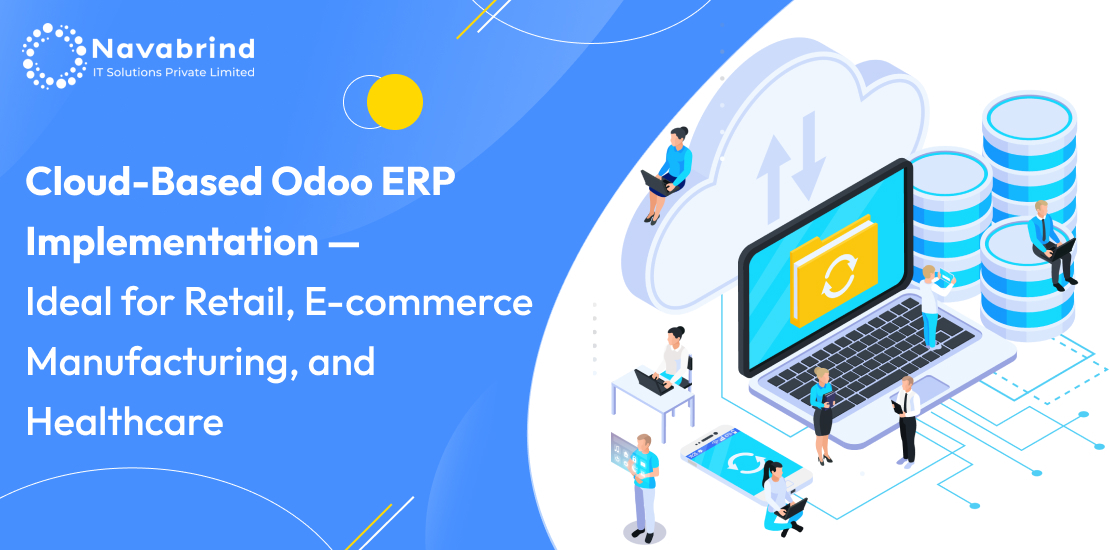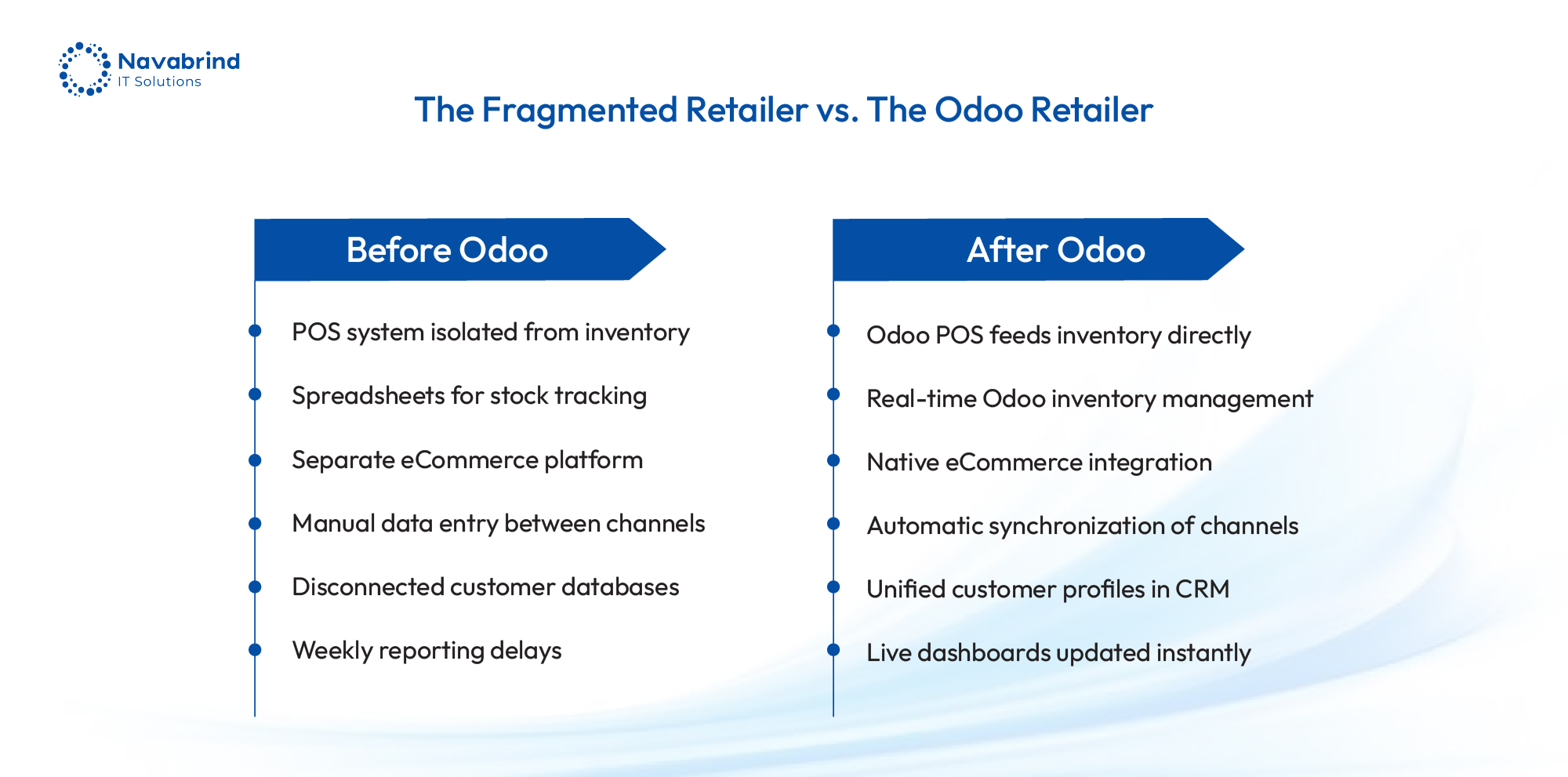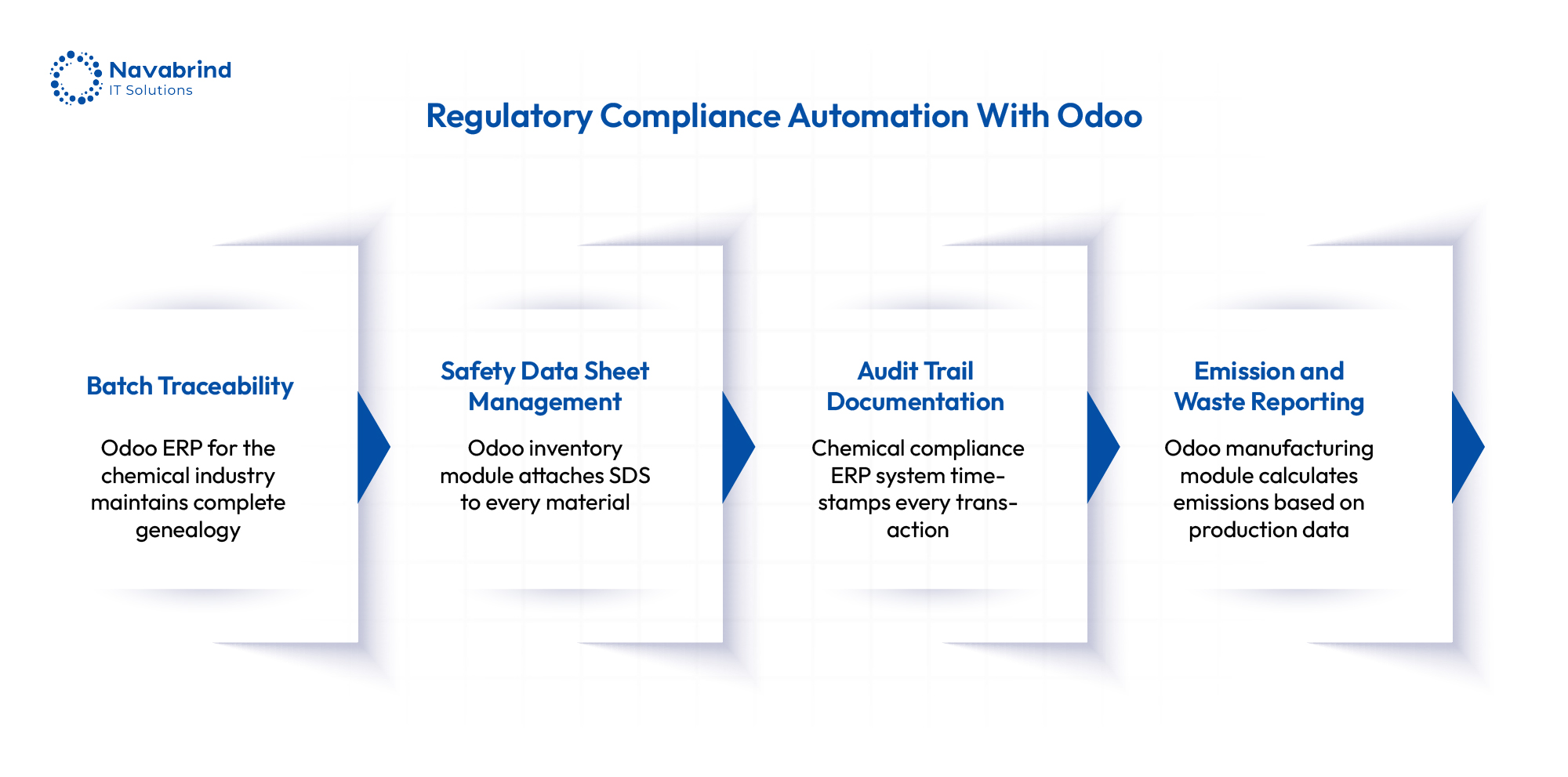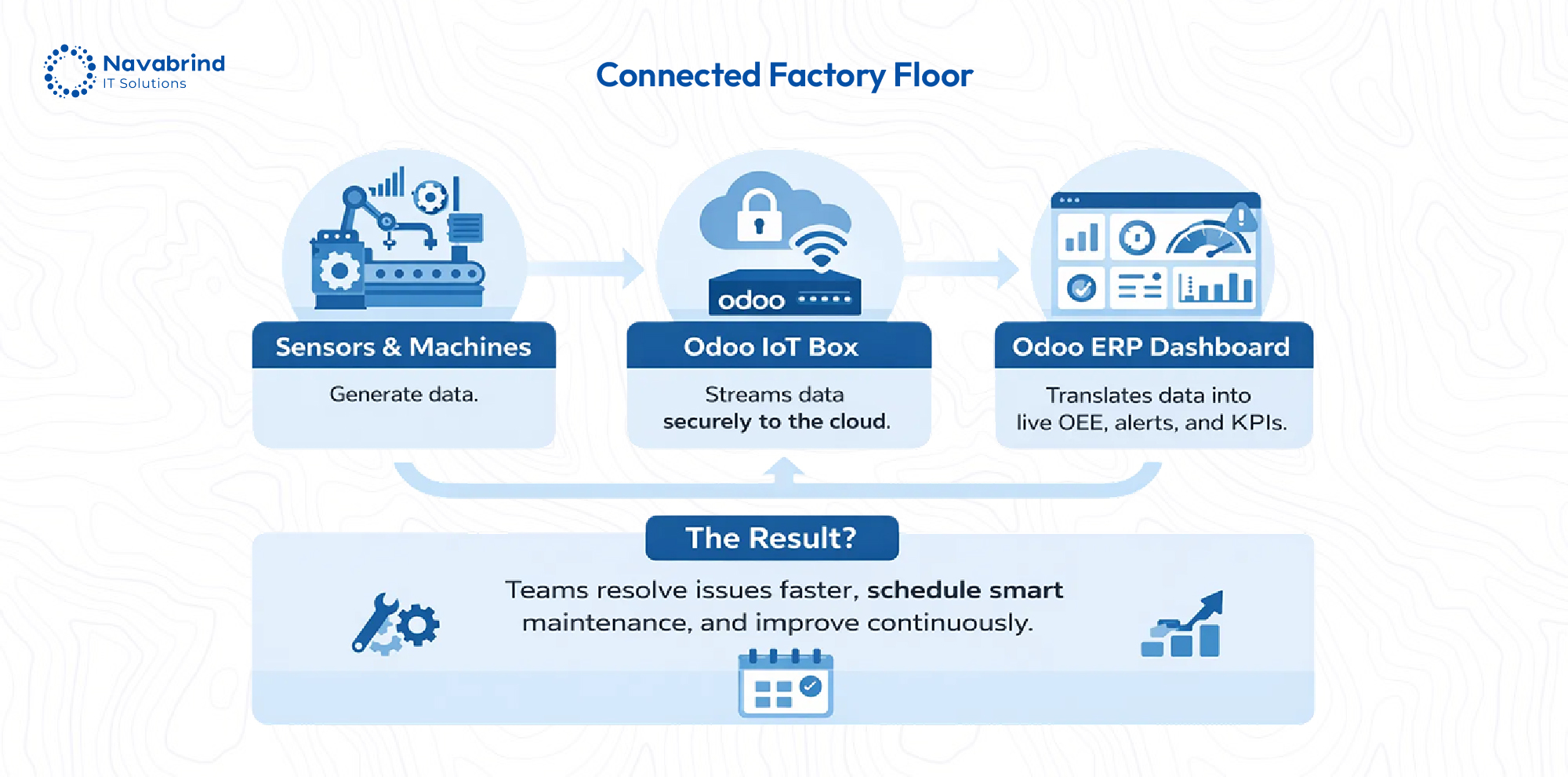Cloud-Based Odoo ERP Implementation — Ideal for Retail, E-commerce, Manufacturing, and Healthcare
- November 7, 2024
- Posted by: Tony
- Categories: Blog, Odoo

Does your business aspire to be agile, scalable, and have interoperable access to data? More and more companies are shifting in this direction and adopting cloud-based ERP solutions. Among the top open-source ERP systems available in the market, Odoo stands out for its modular design, customizable features, and ability to cater to businesses of all sizes and industries.
Cloud-based Odoo ERP offers several advantages, including real-time access to data from any location, reduced reliance on physical infrastructure, and automatic security updates. Organizations using cloud-based Odoo benefit from faster implementation, scalability, and lower total cost of ownership (TCO). Additionally, the platform integrates modules —such as accounting, manufacturing, warehousing, marketing, sales, inventory, HR, and more—into a unified system, enhancing productivity and data flow across departments.
With cloud-based Odoo ERP, digital transformation is no longer a futuristic concept but a reality for businesses. As organizations embrace digitalization, cloud-based Odoo ERP implementation emerges as a platform that integrates core business processes.
AI-powered Cloud-based Odoo ERP Implementation
As businesses expand and embrace dynamic, decentralized workforces, the need for flexible software solutions becomes critical. Businesses are turning to cloud-based AI-powered Odoo 18 as the ideal solution to automate complex processes. AI-driven analytics enhance decision-making by providing predictive insights, automating routine decision-making processes, and identifying cost savings or revenue growth opportunities.
For instance, with AI, users can now predict customer purchasing behavior, recommend the optimal stock levels for specific products, or suggest marketing strategies based on historical data and market trends.

Enhanced Mobile and Cloud Capabilities
When mobile and cloud capabilities power an Odoo ERP implementation, businesses can operate more efficiently in a remote, decentralized environment. Managing business operations from mobile devices is critical as remote work becomes common in many industries.
Odoo’s cloud-based features provide businesses the ability to quickly adapt to changes in the market or scale their operations with minimal infrastructure investment.
Digital Transformation with Cloud-based Odoo ERP Implementation
Businesses across different industries have unique needs. Odoo ERP modules, with their advanced features for manufacturing, healthcare, retail, and e-commerce industries, enable companies to tailor their modules to address specific business challenges and regulatory requirements. As part of the digital transformation with Odoo ERP, the cloud-based deployment model provides businesses access to critical applications anywhere, anytime, and on any device. This remote accessibility, combined with mobile-friendly features, ensures that employees can collaborate efficiently in the office and on the go.
In an era where digital transformation is a critical competitive advantage, cloud-based open-source ERP systems like Odoo are essential for driving long-term growth and success. By embracing digital transformation with Odoo ERP, businesses can experience new levels of operational efficiency.
Key Flexibility Features:
- Remote Access Across Devices: With Odoo’s cloud-based deployment, employees can access relevant applications from their laptops, smartphones, or tablets. This is essential for businesses with remote and field-based teams, such as sales representatives or service technicians, who need to update records or retrieve customer data while on the move.
- No Need for Complex Infrastructure: With a cloud-based open-source ERP system, businesses no longer need to invest in costly on-premise infrastructure. With cloud, companies can reduce hardware costs, eliminate the need for frequent updates, and minimize IT overhead.
- On-Demand Scalability: Odoo’s cloud infrastructure allows companies to scale up or down as needed. Whether adding new users, modules, or features, Odoo ERP implementation allows businesses to expand operations without being constrained by physical server limits.
Enhanced Collaboration Through Cloud-Based Odoo ERP Implementation
A crucial aspect of digital transformation is the interoperability of data. With a centralized cloud-based system, data is always up-to-date and accessible to all authorized users, promoting inter-departmental collaboration.
Benefits of Cloud-Enabled Collaboration:
- Real-Time Data Sharing: The cloud-based Odoo open-source ERP system ensures that changes made in one department, such as sales or inventory, instantly reflect across the entire system. This real-time data sharing ensures everyone works with accurate and up-to-date information.
- Mobile-Friendly Collaboration: Odoo’s mobile app allows employees to stay connected and productive even when away from their desks. Teams can share reports and interact through Odoo’s project management and messaging features, regardless of location.
- Cross-Departmental Communication: The integrated Odoo ERP modules streamline communication and collaboration between departments such as finance, HR, and marketing.
A manufacturing company can leverage cloud-based Odoo ERP to synchronize production, inventory, and sales teams. As sales orders are placed, the inventory team receives real-time updates on stock levels, while the finance team automatically generates invoices. This interaction reduces delays, improves customer service, and increases operational efficiency.
Cloud-based Odoo ERP Implementation offers Robust Security Features
A second important aspect of digital transformation in data security. Odoo ERP implementation addresses security concerns by providing robust security features for data protection, secure access, and regulatory compliance. By leveraging best practices in cloud security, Odoo’s open-source ERP system ensures that business-critical information remains accessible to authorized users.
Key Security Features:
- Data Encryption: Odoo uses encryption protocols to protect data at rest and in transit. This ensures that sensitive information, such as financial transactions and customer details, remain secure during transmission between the cloud server and the user’s device.
Regular Backups and - Disaster Recovery: Odoo’s cloud infrastructure includes automated backups and disaster recovery protocols. In the event of data loss or system failure, businesses can quickly restore data, ensuring minimal disruption to operations.
- Role-Based Access Controls: Odoo ERP features allow businesses to configure role-based access permissions, ensuring that only authorized personnel can access specific data and perform certain actions. For example, an HR manager may have full access to employee records, while a sales representative may only have permission to view this data.
- Compliance with Security Standards: Odoo’s cloud servers comply with industry-standard security certifications, such as GDPR and ISO/IEC 27001, ensuring that businesses meet regulatory requirements for data protection.
A healthcare provider using open-source Odoo ERP for patient management can rest assured that patient records and medical history are encrypted and stored securely in the cloud. With role-based access controls, sensitive patient information is only accessible to authorized personnel, ensuring privacy and compliance with healthcare regulations like HIPAA.
Odoo ERP Features for SMEs
Before we move on to deep-dive into Odoo ERP implementation by industries, let’s review a few Odoo ERP features for small and medium-sized enterprises (SMEs). Odoo’s modular ‘building block’ approach allows businesses to start with essential modules—such as accounting, inventory, sales, and CRM—and expand to adopt others as their operations grow. The platform’s user-friendly interface and automation capabilities simplify the management of everyday tasks. Odoo ERP features ideal for SMEs include support for multi-channel sales, e-commerce, and POS. With Odoo ERP analytics and reporting tools, SMEs can gain insights and track the performance of their business. Additionally, cloud-based Odoo ERP ensures affordability and access to the latest updates without the need for expensive IT infrastructure.
Odoo ERP’s modular structure is the foundation of its flexibility. With a large number of modules and thousands of third-party apps, businesses can easily choose and implement the modules that best suit their operational needs. Odoo ERP customization extends to adapting the software to the industry’s unique processes, compliance requirements, and performance metrics. Here’s how Odoo ERP transforms digital operations in the Manufacturing, Retail, E-commerce, and Healthcare industries.
Odoo Open-Source ERP System for Manufacturing: Tailored for Precision
Manufacturing businesses require ERP solutions to manage complex production processes, inventory control, quality, production part approval process (PPAP), supply chain coordination, regulatory compliance, and more. Odoo’s Manufacturing module can be customized to support production workflows, optimize resource allocation, and ensure quality.
Key Customizable Features for Manufacturing:
- Bill of Materials (BoM) Customization: Odoo ERP features allow manufacturers to define BoMs, including raw materials and detailed assembly instructions. Companies can customize this feature to support multi-level BoMs for complex manufacturing operations.
- Production Scheduling and Workflows: Manufacturers can create customized production workflows, incorporating work centers, routing, and scheduling. Automation tools help to streamline repetitive tasks and reduce lead times.
- Quality Control and Compliance: Manufacturers can tailor quality control features to meet industry standards, such as ISO or FDA regulations. For compliance, automated quality checks can be integrated into the production process.
- Odoo ERP Customization Services: A high-precision electronics manufacturer can customize Odoo’s Manufacturing and integrate it with the Production Part Approval Process (PPAP) to ensure compliance with industry standards, verifying that parts meet quality requirements before and during production, and streamlining the approval process to enhance overall manufacturing quality. The PPAP integration is especially relevant when manufacturing high-precision equipment for the electronics or healthcare industry.
Digital Transformation with Odoo ERP for Retail: Personalized Shopping
Retail businesses face the challenge of managing diverse inventories, sales channels, and customer preferences. Odoo’s Point of Sale (PoS) and Inventory modules are built to handle multi-channel retail operations, including in-store, e-commerce, and mobile sales. Odoo ERP customization services allows retailers to optimize stock levels, offer personalized customer experiences, and streamline supply chain management.
Key Odoo ERP Customization Services Features for Retail:
- Multi-Channel Sales Integration: Retailers can customize Odoo to unify sales across brick-and-mortar stores, e-commerce websites, and third-party marketplaces. The integration provides real-time data on inventory and customer purchases.
- Loyalty and Rewards Programs: Odoo ERP features such as the PoS system can be tailored to include loyalty programs, personalized promotions, and dynamic pricing models. Businesses can offer targeted discounts and rewards by integrating customer data from CRM and sales modules.
- Inventory Management: Retailers can customize inventory tracking with barcode scanning, automatic stock replenishment, and real-time visibility of stock levels across multiple locations. Odoo’s automated reorder points ensure that retail businesses maintain optimal stock levels.
- An online and in-store fashion retailer can customize Odoo ERP modules, such as PoS to offer a unified view of customer transactions. This allows for consistent loyalty rewards, personalized recommendations, and returns across all channels.
Cloud-based Odoo ERP Implementation for E-Commerce: Automating and Scaling Operations
E-commerce businesses need to scale quickly and manage high transaction volumes. Odoo’s E-Commerce module is a customizable platform for online stores, offering integrations with payment gateways, shipping providers, and marketing tools. Businesses can integrate their e-commerce operations with Odoo ERP modules, such as inventory, CRM, and accounting.
Key Odoo ERP Customization Services for E-Commerce:
- Custom Webstore Design: Odoo’s website builder allows e-commerce businesses to create customized storefronts. The platform supports various design elements, product categories, and customer-specific pricing models.
- Automated Order Fulfillment: Odoo’s e-commerce module integrates with the inventory system to automate the order fulfillment process. Businesses can set up workflows for automated order confirmation, invoicing, and shipping, reducing manual intervention and speeding up delivery times.
- Marketing and SEO Tools: Odoo offers built-in marketing tools, including email and social marketing, SMS marketing, and SEO optimization. Businesses can set up automated order confirmation, invoicing, and shipping workflows, reducing manual intervention and speeding up delivery times.
Odoo ERP Implementation for Healthcare: Patient-Centric Solutions
Healthcare organizations need an open-source ERP system to manage patient data, ensure compliance with strict regulations, and maintain communication across departments. Odoo ERP customization capabilities make it a powerful tool for healthcare providers, allowing for the integration of patient management, billing, inventory, and compliance tracking into one cohesive system.
Key Odoo ERP Customization Features for Healthcare:
- Patient Records and Billing: Odoo’s CRM module can be customized to track patient interactions, appointments, and treatment plans. Integration with the accounting module allows healthcare providers to automate billing and manage insurance claims.
- Compliance and Reporting: Healthcare organizations can customize Odoo to meet HIPAA, GDPR, or local healthcare regulations. Automated compliance workflows ensure that patient data is securely managed and that reports are accurate and timely.
- Inventory Management for Medical Supplies: Healthcare providers can track medical equipment and supplies in real-time, ensuring that critical items are available. Custom inventory dashboards help healthcare administrators monitor usage trends and plan for future needs.
As industries evolve in a hyperconnected and data-driven world, digital businesses need solutions that offer adaptability and foresight—cloud-based Odoo ERP implementation positions companies to thrive by integrating operations for access to data and growth. For sectors like retail, e-commerce, manufacturing, and healthcare, where agility, automation, and customer-centricity are crucial, Odoo’s cloud platform delivers a future-ready foundation. With emerging technologies such as AI, IoT, and advanced analytics and reporting tools increasingly becoming part of business ecosystems, Odoo ERP’s flexible architecture ensures companies can easily integrate innovations, stay competitive, and grow sustainably.
Frequently Asked Questions
1.Is Cloud-based Odoo ERP implementation better than On-Prem Odoo?
Interestingly, an Odoo open-source ERP system can be hosted by companies in three different ways, namely
- Odoo Online is a SaaS method
- Odoo.sh offers users a dedicated cloud
- Odoo On-Premises is hosted on the user’s infrastructure
As a SaaS offering, Odoo Online can be deployed with a few clicks as it comes with a pre-configured email server. The benefit of Odoo Online is that users do not need to worry about technical aspects because Odoo monitors the platform 24/7 and provides unlimited bug fixing and security updates to keep the solution up and running. Odoo Online is the best ERP software for small businesses.
As a PaaS, Odoo.sh enables users to deploy their cloud platform. It has built-in tools for developing additional apps and custom features, such as integration with Github, an online editor, branch management, and more.
Users looking for an on-premise solution can deploy Odoo Enterprise on their servers. This is ideal for large companies with advanced technical resources to manage and maintain the ERP. On-prem involves a service contract and working with in-house resources or a third-party implementation partner. Large companies prefer on-prem because they have complete control over installation. They can easily integrate with apps or build apps on Odoo from scratch!
The Odoo version you choose depends on your company’s needs and willingness to customize the ERP to your business needs. The SaaS version is the most cost-effective Odoo ERP for SMEs.
2.What is the difference between Odoo Online and Odoo.sh?
There are many differences between Odoo Online and Odoo.sh.
- Odoo Online — Odoo Online may be adequate for businesses with standard workflows as it provides a host of pre-built modules that can be configured. However, there are limited Odoo ERP customization services. Odoo manages the server resources, backup, and security; users cannot choose specific configurations. Odoo Online is more cost-effective than Odoo.sh and users do not require dedicated technical resources to manage the platform.
- Odoo.sh — Odoo.sh is just the solution for businesses requiring unique workflows that are unavailable in pre-built modules. It offers a high level of customization. Users can quickly install custom modules, modify existing applications, and integrate with third-party systems. Users can choose the server instance size and resources and ultimately control backups, security configurations, and access management. Due to its increased flexibility and control, odoo.sh costs more than Odoo Online. Users must have in-house resources or work with an implementation partner, such as Navabrind IT Solutions, for the customization.
3.Is cloud-based Odoo ERP better than the on-prem version?
Whether you decide to go with cloud-based or on-premise Odoo ERP implementation depends on the needs of your business. On-premise allows users complete control of their IT infrastructure. This means that they must invest in a highly skilled IT team to oversee the deployment, customization, and management of Odoo ERP. On-prem is beneficial for large organizations that expect extensive customization. With on-prem, businesses can utilize apps located on internal hardware, and data can be stored locally. On-premise Odoo can be expensive as it involves high hardware and IT skills.
A cloud-based Odoo ERP implementation is a great option for small or mid-sized organizations that do not require extensive customization, and want to keep technology costs low. Cloud hosting allows users to scale easily and adjust the server configurations to accommodate increased traffic or scale down during quieter periods. Installing custom modules is easy in a cloud hosting environment and businesses can work with an Odoo certified partner.
4. What is the best version of Odoo ERP?
As a company that invests in its customers, Odoo is constantly releases updates, new features, and modules. Odoo v18 was launched in the latter half of 2024 and has extensive AI capabilities. To review the latest Odoo ERP features, visit this blog-post Odoo ERP v18: It’s New, It’s Smart, It’s Sleek, It’s Powerful!
For manufacturers, Odoo v18’s product catalog on BOM and MO ensures users have product information at hand. Users can add special instructions and notes directly to work orders, ensuring important details are not lost.
If you must choose between the Community and Enterprise version, it is important to map the Odoo ERP features that you need. The Enterprise version offers features and customization options that the Community version does not. Compared to other ERPs in the market, an cloud-based Odoo ERP implementation is more cost-effective and user-friendly.
For users with warehouses or retail operations, the multi-scan feature allows for scanning multiple items, and the barcode lookup feature allows for creating product records on the spot just by scanning. Odoo 18’s push/pull rules in the inventory module make it easier to direct stock flow. Valuation by serial number adds a layer of detail to inventory tracking. The new dispatch management feature lets users manage shipments with precision.
5.Is my data safe in Odoo cloud-based ERP?
Towards helping their clients on their digital transformation with Odoo ERP, the company prioritizes data security with strict protocols. They maintain 14 full backups of every database for a minimum of 3 months, replicated across three data centers. Each customer’s data is stored in a dedicated database, with access controls ensuring full isolation between customer databases on the same server cluster. Passwords are encrypted using the PBKDF2+SHA512 method, which adds extra protection through salting and thousands of iterations.
For support, Odoo helpdesk staff can log into a customer’s account, but only through their credentials. Odoo Cloud servers run on hardened Linux systems, and are constantly updated with the latest security patches, and are hosted in secure data centers, such as OVH and Google Cloud.
6. Is it easier to migrate to a new version when you are using cloud-based Odoo ERP?
Yes, migrating to a new version of cloud-based Odoo ERP is easy. Work with an Odoo-certified partner, such as Navabrind IT Solutions, for your migration. With over 12 years of experience working with e-commerce businesses worldwide, we are process-driven and use industry-standard technologies to stay within time and budget. We have expertise in consulting, migrating, integrating, maintaining, and supporting our clients. For companies looking for Odoo ERP customization services, Navabrind IT Solutions has customized Odoo for dozens of customers across retail, healthcare, manufacturing, e-commerce, logistics, and other industries. Reach out to us to access our references and to schedule a 30-minute call.
7.What is Odoo ERP, and how can it benefit my SME?
Open-source Odoo ERP is used by over 12 million users worldwide. The ERP offers several modules namely Accounting, Manufacturing, Inventory, PoS, Marketing CRM, e-commerce, and HR. Odoo ERP integrates with thousands of modules and is widely used as it is easy to deploy and learn. Odoo ERP for SMEs enables quick adoption of out-of-the box features, minimal customization and automation within days.
8.How customizable is Odoo ERP to fit specific business needs?
As an open-source ERP system, Odoo is recognized for its modular architecture. Not only can businesses gradually adopt modules based on their needs, but they can integrate with thousands of third-party applications. Large and medium companies engage in extensive Odoo ERP customization, tailoring modules and applications to align with their business workflows. , ensuring the ERP system adapts to their operations rather than the other way around (Open Source Integrators)
9.What are the advantages of implementing Odoo ERP in the cloud?
Cloud-based Odoo ERP implementation has several advantages. The cloud is an important element of digital transformation, making business processes accessible anytime and from anywhere. With the cloud, it is easy for a company to upgrade to the new version of the ERP, capitalizing on new features such as the AI offered in Odoo 18. The cloud is cost-effective for SMEs, who can reduce costs on expensive hardware and infrastructure management. Large enterprises can easily customize and access Odoo ERP analytics and reporting tools from anywhere. The cloud simplifies integration with third-party applications and reduces the cost of ownership.
Schedule a conversation with us now!
written by
Tony
Related Articles
-
Post
Odoo ERP for the Retail Industry: Driving Efficiency and Growth
Odoo ERP for the Retail Industry: Driving Efficiency and Growth February 27, 2026 Posted by: Vasanth Anantharaman Categories: Blog, Odoo for Retail industry No Comments Why the Retail Industry Runs Better on Odoo ERP Retail runs on dozens of disconnected apps. One tool for sales, another for stock, a third for loyalty. None speak to -
Post
From Formula to Forecast: Odoo’s Transformative Edge in Chemical Manufacturing
From Formula to Forecast: Odoo’s Transformative Edge in Chemical Manufacturing February 27, 2026 Posted by: Jaishree Jayabal Singh Categories: Blog, Odoo ERP for Chemical Industry No Comments Odoo ERP for Chemical Industry Solves the Disconnection Problem Chemical manufacturing operates across multiple fronts, production floors, warehouse storage, laboratory testing, and regulatory reporting. Managing these as isolated -
Post
How Odoo ERP Helps Manufacturers Track Machine Efficiency and Move Toward Industry 4.0
How Odoo ERP Helps Manufacturers Track Machine Efficiency and Move Toward Industry 4.0 February 25, 2026 Posted by: Venkadesh Nagarajan Category: Uncategorized No Comments The Shift Toward Smart Manufacturing Machine efficiency is the core of manufacturing. Without it, cost control and scalability are impossible. Industry 4.0 accelerates this, merging IoT and data analytics to drive
How can we help you?
Get in touch with a solutions consultant that can share best practices and help solve specific challenges.










